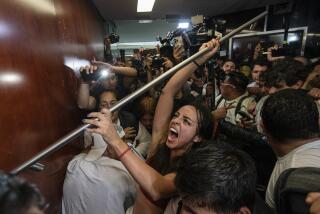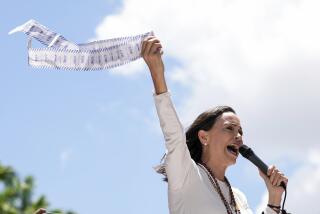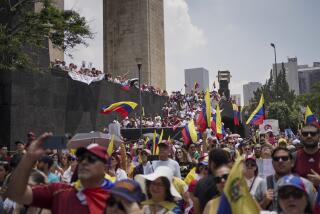Venezuelan rally turns violent
CARACAS, VENEZUELA â Soldiers used tear gas, plastic bullets and water cannons to scatter tens of thousands who massed Thursday to protest constitutional revisions that would permit Venezuelan President Hugo Chavez to run for reelection indefinitely.
Led by university students, protesters chanted, âFreedom! Freedom!â and warned that 69 amendments drafted by the National Assembly would violate civil liberties and derail democracy.
It was the biggest turnout against Chavez in months.
âThis is a dictatorship masked as democracy,â said Jorge Rivas, an 18-year-old student. âChavez wants our country to be like Cuba, and weâre not going to allow that to occur.â
Authorities broke up the protest outside the headquarters of the countryâs electoral council, reporting that six police officers and one student were injured. Students said dozens of protesters were hurt during the melee. The Globovision TV network broadcast video of several police officers beating an unarmed protester with truncheons.
Student leader Freddy Guevara said it was not immediately clear how many students were arrested, and he urged local human rights groups to help verify the number of detained protesters.
Students hurled rocks and bottles, and a few lifted sections of metal barricades and thrust them against police officers holding riot shields. Students retreated later when officers fired plastic bullets.
Rock-throwing clashes between students and Chavez supporters continued at a nearby university campus.
âChavez wants to remain in power his entire life, and thatâs not democracy,â said Gonzalo Rommer, 20, a student who joined protesters marching to the National Elections Council.
Deputy Justice Minister Tarek El Aissami blamed students for the violence, saying they forced their way through police barricades.
But Vicente Diaz, one of the National Election Councilâs five directors, accused national guardsmen and police of using excessive force to disperse protesters. âWe absolutely condemn the behavior of the authorities,â Diaz said.
The amendments would give the government control over the central bank, create new types of cooperative property, allow authorities to detain citizens without charge during a state of emergency and extend presidential terms from six to seven years while allowing Chavez to run again. He is in his second full six-year term, which is due to end in 2012.
To take effect, the changes must be approved by voters in a Dec. 2 referendum. Lawmakers are expected to give their final approval today during a special congressional session.
Opposition parties, human rights groups and representatives of the Roman Catholic Church fear that civil liberties would be severely weakened under the amendments.
Chavez denies that the revisions threaten civil liberties.
He and his supporters say the changes will help move the country toward socialism, while giving neighborhood-based assemblies more decision-making power in using government funds for local projects such as paving streets and building public housing.
More to Read
Sign up for Essential California
The most important California stories and recommendations in your inbox every morning.
You may occasionally receive promotional content from the Los Angeles Times.










